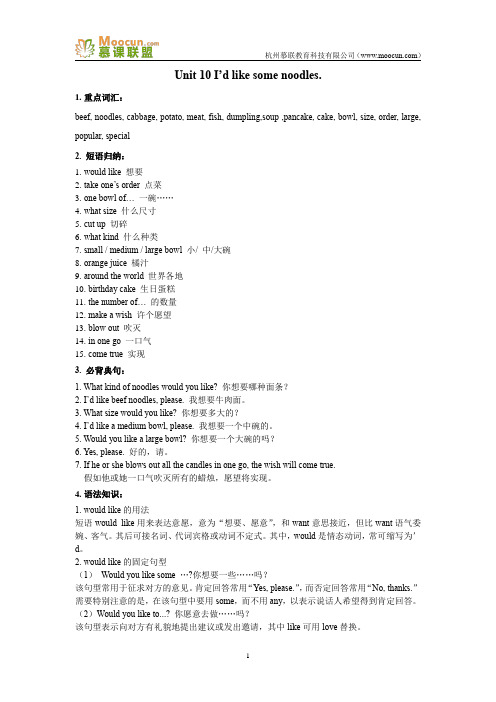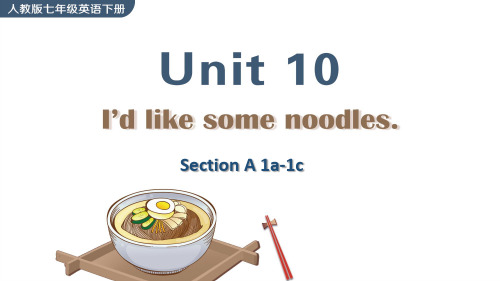七年级英语下册第10单元课件
人教版七年级英语下册第十单元知识点归纳

人教版七年级英语下册第十单元知识点归纳Unit 10: I’d like some noodles.In this unit。
we learn some XXX。
For example。
"would like to do sth" means "want to do something"。
and "take one's order" means "ask for someone's food order"。
We also learn some specific dishes such as "beef soup" and "mapo tofu with rice"。
nally。
we learn about different sizes of bowls of noodles。
such as "small/medium/large bowl noodles".Furthermore。
XXX "green tea" and "orange juice"。
We also learn about different types of food from "around the world" and "birthday cake"。
When blowing out the candles on a birthday cake。
we make a wish and hope that it comes true。
Sometimes。
we can eat an XXX "in one go"。
and we might need to "cut up" our food into smaller pieces.In n。
初一英语第10单元

“教学中的互联网搜索”教案设计课题: Where did you go on vacation?单位:新疆乌鲁木齐市第92中学作者:苏莉Unit 10 Where did you go on vacation?教案背景:Where did you go last vacation?是七年级下第十单元内容。
其教学知识重、难点是过去式的认知、使用。
而当时学生按正常的教学进度才学完第八单元。
学生所认知掌握的是有关一般现在时知识。
在学生没有任何过去时基础知识背景下,即跨越两个单元,既要处理好动词的过去式,又要实现新词汇及目标语言的掌握。
教材分析:谈论过去时,需要将语言知识与学生实际生活相结合,以恰当的活动为载体,让学生在课堂中练习,掌握知识与能力。
教学方法:PPP(Presentation, Practice, Production)教案设计:Language aims(语言目标):Vocabulary New Words:camp, museum, guide, exam, rainy,New phrases:summer camp, the Great Wa ll, the Palace Museum, Tian’an Men Square, go to the mountains, on vacation, bus trip, feel happy Expressions:Where did you go on vacation? I went to New York City. Where did he /she go on vacation? He / She went to the mountains. Did you /he /she go to Central Park?Structures:Where did you go on vacation? I went to Summer Camp.Where did they go on vacation? They went to New York City.Where did he / she go on vacation? She / He visited his / heruncle.Did you / she / he / they go to Central Park?Yes, I / he/ she/ they do. No, I / he/she/they don’t.Teaching key point(教学重点):Where did you go on vacation? I went to Summer Camp.Where did they go on vacation? They went to New York City.Where did he / she go on vacation? She / He visited his / heruncle.Teaching difficult point(教学难点): The simple past tenseAbility aims(能力目标):Listening, speaking, reading and writing教学过程:Teaching proceduresStep 1: Warming upActivity 11.Play a guessing game to show the structure “What doyou do on weekend?”watch, clean, go, doAsk students to change the words into the past forms together.“What did you do last weekend?”watched, cleaned went and did,Read the past forms loudly.2.Give students a picture to show the differencesbetween the time and the tenses.Activity 2Go on asking where did you / he / she/ go last weekend using the verbs they learned. Focus their attention on the different forms of verbs.Step 2: PresentingLet students say out the verbs learnt before and teacher can help them say as many as possible. Show new words: summer camp, the Great Wall, the Palace Museum, Tian’an M en Square, go to the mountains, on vacation,1.Ask students: Did you stay at home yesterday?Did you stay at school last weekend?Where did you go on vacation?Where did your parents go on vacation?2.Repeat the new language points.Step 3: PracticingActivity 11. Change the forms of these verbs:2. Students work in pairs. Ask and answer about wheretheir parents, friends and they went yesterday / lastweekend / on vacation.Model: A: Where did you go yesterday?B: I stayed at home. Did you stay at home? A: Yes, I did. No, I did n’t. I went to the park.B: Where did your parents go on vacation?A: They went to Beijing last month.3. Check some pairs.Activity 21.Point to the pictures. Let students talk about wherethe people went in pairs.Model: visit ---visited2.Check the answers.Activity 31.Point out the numbered list of activities. Ask studentsto repeat.2.Then ask students to match each phrase with one of thepictures.3.Check the answers.Step 4: Practice1.Point to the pictures. Ask students to tell what theperson did in each scene.For example: She went to the mountains.He went to the beach.2.Do pairwork.3.Check some pairs.1.went to the mountains2.visited my uncle3.stayed at home4.went to New York City5.went to summer camp4.Students work in pairs. Ask and answer about where Tina/ Brad /Sally / Xiang Hua and Tom went on vacation. Step 5:Consolidation1. Memory challenge.2. Play it the first time, show how to do for students.3. Check the answers.Did Dory go to Central Park? Yes, she did.4. Fill in the blanks.5. Check the answers.6. True or false.Step 6: Practicing ( groupwork )Activity 11.Ask students in your group: Where did you go lastvacation?2. Give a talk about the last vacation of the studentsin your group.Step 7: HomeworkWrite a passage about your last vacation.教学设计优势该课在目标设定、教学过程、课程评价和教学资源的开发等方面我都以突出学生为主体的思想为指导。
人教版七年级下册英语unit 10单元课件ppt(知识点超全)

1.May I take your order?请问您可以点餐了吗?
-23-
order作名词:点菜
take one's order点菜
I want to order the beef noodles.我想点牛肉面。
order作名词:命令,指示
She takes orders only from his father.他只听从他父亲的吩咐。
-26-
Would +主语+ like. . . ? ......想要......吗? 句型的答语:
肯定:Yes, please. /OK. /All right. ;
否定:No, thanks.
如需用一些, 用some而不用any。
Would you like some fruit? 你想来点水果。
-1-
Unit 10 I'd like some noodles.
-2-
A: What would you like? B: I’d like some…
oranges
apples
Fruits
-3-
A: What would you like?
B: I’d like some…
bananas
strawberries
-12-
Noodle house
specials
What kind of noodles are they?
-13-
What size bowl of noodles would he/she like? He/She’d like a…bowl of noodles.
small
medium
large
人教版英语七年级下Unit10单词、知识梳理、词汇句式精讲

人教版英语七年级下Unit10单词、知识梳理、词汇句式精讲Unit10 单词(音标)noodle ['nuːdl] n. 面条mutton ['mʌtn] n. 羊肉beef [biːf] n. 牛肉cabbage ['kæbɪdʒ] n. 卷心菜;洋白菜potato [pə'teɪtəʊ] n.土豆;马铃薯special ['speʃəl] n.特色菜;特价品adj. 特别的;特殊的would [wʊd] modal v.(表示意愿)愿意would like愿意;喜欢yet [jet] adv. (常用于否定句和疑问句)还;仍然large [lɑː(r)dʒ] adj.大号的,大的order ['ɔː(r)də(r)] n.&v. 点菜;命令takeone’s order 点菜size [saɪz] n. 大小;尺码bowl [bəʊl] n. 碗one(large) bowl of…一(大)碗tofe [təʊfu:] n. 豆腐meat [miːt] n. (可食用的)肉dumpling ['dʌmplɪŋ] n.饺子porridge ['pɒrɪdʒ] n. 粥;面糊onion ['ʌnjən] n. 洋葱fish [fɪʃ] n. 鱼;鱼肉pancake ['pænkeɪk] 烙饼;薄饼world [wɜː(r)ld] n. 世界aroundthe world世界各地answer ['ɑːnsə] v. 回答n. 答案different ['dɪfərənt] adj.不同的cake [keɪk] n. 蛋糕candle ['kændl] n. 蜡烛age [eɪdʒ] n. 年龄makea wish许愿blow [bləʊ] v. 吹blowout吹灭if [ɪf] conj. 如果will [wɪl] v. 将要;会the UK(=theUnited Kingdom) [,ju:’keɪ]([jʊ'naɪtɪd ‘kɪŋdəm]) n.英国candy ['kændi] n. 糖果lucky ['lʌki] adj. 幸运的popular ['pɒpjʊlə] adj.受欢迎的;普遍的getpopular受欢迎;流行cutup切碎idea [aɪ'dɪə] n.想法;主意bring good luck to…给……带来好运Unit10 知识梳理【重点短语】1. would like sth. 想要某物2. would like to do sth. 想要做某事3. put on 穿上,戴上4. take one’s order 点菜5. in the beef noodles 在牛肉面里6. mapo tofu with rice麻婆豆腐外带大米7. what kind of noodles什么种类的面条8. a large bowl of noodles一大碗面条9. a medium bowl of noodles 一中碗面10. a small bowl of noodles 一小碗面条11. what size 什么尺寸12.May I take your order? 可以点餐了么?13. beef noodles with carrots带有胡萝卜的牛肉面14. green tea 绿茶15. orange juice 橙汁16. around the world 世界各地17. in different countries 在不同的国家18. birthday cakes with candles带蜡烛的生日蛋糕19. the birthday person 寿星20.make a wish 许愿21. blow out the candles 吹灭蜡烛22. in one go 一口气,一次性的23. come true 实现24. get popular 变得流行,受欢迎25. long noodles 长寿面26. cut up 切碎/断27. a symbol of long life 长寿的象征28. be different 不同的29. be the same 一样的30. bring good luck to sb. 带给某人幸运31. have different kinds of …有不同种类的......【重点句型】1. What would you like?您需要什么?2. I'm not sure yet. Are there any vegetables in the beef noodles? 我不确定,牛肉面里有蔬菜吗?3. Yes, there are some tomatoes.有,里面有西红柿。
人教七下Unit10_语法专项课件(可数名词和不可数名词)

如:a book; two boys
可数名词变复数 2.1 规则变化
类别
构成方法
一般情况
词尾加-s
以s, x, ch, sh等结尾的 词尾加-es
名词
以“辅音字母+y”结 把y改为i,再加-es
尾的名词
以f或fe结尾的名词 以o结尾的名词
把f或fe变为v,再 加-es 有生命的加-es, 无生命的加-s
埃及人 an Egyptian—Egyptians 德国人 a German—Germans
口诀记忆 中日不变英法变,其余s加后面。
可数名词变复数 2.3 复合名词的复数形式
构成方法 一般的复合名词,只用把中心 词变为复数形式(中心词一般
是第二个名词) 由man和woman构成的复合名
词,二者均变为复数形式
much, little, a little只能修饰不可数名词。
易错点3 不可数名词的“量”
不可数名词没有复数形式,表示量的时候需要借助于“数词/ 冠词+量词+of+不可数名词”的结构来表示。 注意:1)量词可以是单数也可以是复数。
2)量词如果是复数形式,谓语动词则用复数。 例: There are two glasses of milk on the table. 桌子上有两杯牛奶。
可数名词变复数 2.2 不规则变化
① 改变名词中的元音字母或其他形式 foot — feet, tooth — teeth, goose — geese
man — men, woman — women, child — children, mouse — mice
②单复数同形词 deer, sheep, fish等 由汉语音译表示度量、币值等单位量词,如:five yuan
七年级英语下册第十单元知识点总结

七年级英语下第十单元复习Unit 10 I’d like some noodles.Name: Class:1.would like = want 想要would like to do sth.--->I’d like to go shopping. 我想去购物;would like sb. to do sth. --->She’d like you to cook dinner. 她想要你做晚饭;2.beef and tomato noodles = noodles with beef and tomatoes. 牛肉西红柿面3.take one’s order = have one’s order名词点菜4.what kind of 什么种类的 what size of 什么型号的5. a small/medium/large bowl of noodles 一份小/中/大碗的面条6. a big bowl for 4 yuan, a small one for just 2 yuan 大碗的4元一碗, 小碗的2元1碗7.blow out all the candles in one go 一口气吹灭所有蜡烛8.make a wish 许愿9.get popular / get lost/ get very cloudy-->get + 形容词表示变得怎样10.bring...to... 给某人带来什么或把某物带到某地来11.bring good luck to... 给......带来好运12.have eggs and noodles for breakfast --> have ...for + 三餐e true 实现14.short of 缺少15.cut up 切碎16.the number of ... ......的数量17.around the world 全世界1.-What would you like 你想要什么-I’m not sure yet. 我还没想好;2.-What kind of noodles would you like 你想吃哪种面条-I’d like beef noodles./I’d like noodles with beef.3.What size bowl of noodles would you like 你想要多大碗4.I’d like a small/medium/large bowl. 我想吃一份小/中/大碗的面条;5.May I take/have your order6.If he or she blows out all the candles in one go, the wish will come true.如果他她一口气把蜡烛全部吹灭的话,许的愿望便会成真;一、完成句子;1.China is a l country with long history.2.What s shoes would you like3.-What’s your a -It’s 558 Bridge Street.4.They usually ________订购 food and drink in this restaurant.5.We have many great _______ 特色菜 in the restaurant.6.There ______be some beef and eggs in the noodles.7.I would like you come to my house.8.Look, they buy fruit and vegetables in the market.9.Let them ______help us with English.10.I as well as Jack _____do homework in the classroom now.11.They enjoy _________have beef.12. There are some ________tomato and _______ porridge on the table.13. What about ________ swim in the pool14. How about something ________eat二、翻译下列短语1. 实现2. 点菜3. 吹灭4. 想要5. 一口气6. 许愿7. 变得流行 8. 给......带来好运9. 缺少 10. 切碎三、翻译句子1. 你想吃什么2. 他还没想好;.3. 牛肉面里有蔬菜吗4. 蜡烛的数量就是人们的年龄;.5. 过生日的人必须对着蜡烛许愿,并吹灭蜡烛;.四、单项选择1. -What____ of dumplings do you want-Carrot and beef dumplings, please.A. sizeB. kindC. bowlD. \2. We like coffee_____ milk and sugar in it.A. hasB. withC. ofD. for3. -Would you like some bread -________.A. No, I wouldn’tB. That’s all rightC. Yes, pleaseD. Yes,I would4. My brother would like______ a friend of ______.A. to see, himB. seeing, himC. to see, hisD. seeing, his5. Welcome to our restaurant. We have_____.A. special somethingB. something specialC. anything specialD. specialanything6. Would you like______A. some juiceB. any juiceC. some juicesD. any juices7. -What would Mary like -She’d like_____.A. teaB. a teaC. a cup teaD. teas8.He has a nice house ______ an expensive car.A. tooB. alsoC. eitherD. as well as9.― Would you mind my smoking ― ____.A. Not at allB. I have no ideaC. Yes , pleaseD. I don’t know10. Andrew usually has fruit ______ dinner.A. ofB. forC. atD. with五、完型Do you want to stay healthy Let me tell you 1 have a healthy diet.In the morning, you can eat some bread, cakes and eggs. You should drink a glass of milk. It’s very important for you because it can 2 you much energy能量.It 3 good for you to go to school or work without breakfast.You must feel very 4 at lunchtime. So you have something good 5 lunch . You can have some fish or chicken. 6 , such as carrots and tomatoes, are also very important because they can keep you healthy.In the evening, you must be tired. You should eat things 7 noodles or others with some vegetables. But remember 8 eat too much because you can’t do much exercise in the evening. Before going to bed, you can have a glass of milk. It can 9 you sleep well.At last, you should eat more 10 . Here’s a proverb谚语:An apple a day keeps the doctor away.1. A. how B. how to C. what D. what to2. A. get B. spend C. give D. take3. A. does B. doesn’t C. is D. isn’t4. A. happy B. sad C. hungry D. busy5. A. to B. for C. of D. with6. A. Vegetables B. Meat C. Fruit D. Snacks7. A. are like B. like C. look like D. likes8. A. don’t B. to C. not to D. 不填9. A. turn B. start C. improve D. help10. A. apples B. oranges C. bananas D. pears六、阅读AMany people like to read the Guinness Book of World Records吉尼斯世界纪录大全, and some people want to be in it How do people get their names in the book They do something new and different,such as making the world’s largest cake with more than 54,000 eggs.For many people, it is fun to make world records 记录. It’s exciting. But who eats the cakeWhile some people are making world records, others don’t have much food to eat. Hunger is a very serious problem in many places. How many old people do not have enough money to buy good food How many children go to bed without dinner The answer is “too many”.1. How do people get their names in the Guinness Book of World RecordsA. They do something new and interesting.B. They do something new and different.C. They only have a large cake.D. They only make a large cake. 2. How many eggs are there in the world’s largest cakeA. 54,000B. More than 54,000C. Less than 54,000D. We don’t know.3. What’s Chinese meaning of the word “problem ”A. 粮食B. 人C. 问题D. 纪录4. Are there any children go to bed without dinner in the worldA. Yes, there aren’tB. Yes.C. No.D. Yes, there’re 54,000 5.What should we do when some poor people don’t have any foodA. We do nothing.B. We can make world records.C. We can give them some food.D. We are poor, too.BHere is a menu for a fast food restaurant. The prices are in American money, called dollars and cents. There are 100 cents in a dollar.6. From the menu, how much is a small hamburgerA. One hundred and eighty dollarsB. Two dollars and thirty centsC. Eighty centsD. One dollar and eighty cents7. If you have only three dollars, what can you buyA. A large salad and a large ice cream.B. A large chicken burger and a small cup of tea.C. A small vegetable burger and a large chocolate.D. An apple pie and a large hamburger with cheese.8. Jam is a kind of _____.A. main mealsB. side dishesC. dessertsD. drinks9. What can’t we buy in the restaurantA. CoffeeB. FriesC. HamburgerD. Beef10. A thirsty boy may ask for _____.A. coca colaB. donutsC. friesD. a chicken burger。
人教版英语七年级下册单元Unit 10 知识点+测试卷+思维导图

Unit 10 I’d like some noodles.1.重点词汇:beef, noodles, cabbage, potato, meat, fish, dumpling,soup ,pancake, cake, bowl, size, order, large, popular, special2. 短语归纳:1.would like 想要2.take one’s order 点菜3.one bowl of… 一碗……4.what size 什么尺寸5.cut up 切碎6.what kind 什么种类7.small / medium / large bowl 小/ 中/大碗8.orange juice 橘汁9.around the world 世界各地10.birthday cake 生日蛋糕11.the number of… 的数量12.make a wish 许个愿望13.blow out 吹灭14.in one go 一口气e true 实现3. 必背典句:1. What kind of noodles would you like? 你想要哪种面条?2. I’d like beef noodles, please. 我想要牛肉面。
3. What size would you like? 你想要多大的?4. I’d like a medium bowl, please. 我想要一个中碗的。
5. Would you like a large bowl? 你想要一个大碗的吗?6. Yes, please. 好的,请。
7. If he or she blows out all the candles in one go, the wish will come true.假如他或她一口气吹灭所有的蜡烛,愿望将实现。
4.语法知识:1. would like的用法短语would like用来表达意愿,意为“想要、愿意”,和want意思接近,但比want语气委婉、客气。
人教版初中七年级英语下册第十单元Unit10教案含教学反思

⼈教版初中七年级英语下册第⼗单元Unit10教案含教学反思第10单元I’d like some noodles.类别课程标准要求掌握的内容话题Food⾷物Section A 单词noodle n.⾯条beef n.⽜⾁potato n.⼟⾖;马铃薯would modal v.(表⽰意愿)愿意yet adv.还;仍然large adj.⼤号的;⼤的order n.& v.点菜;命令size n.⼤⼩;尺码bowl n.碗meat n.(可⾷⽤的)⾁special n.特⾊菜;特价品adj.特别的;特殊的cabbage n.卷⼼菜;洋⽩菜mutton n.⽺⾁tofu n.⾖腐短语would like愿意;喜欢take one’s order 点菜what size多⼤(尺⼨)one (large)bowl of…⼀(⼤)碗……what kind of哪⼀种……句型1.—What would you like? 您想要点什么?—I’d like some noodles. 我想要些⾯条。
2. Are there any vegetables in the beef noodles?⽜⾁⾯⾥有蔬菜吗?3. We’d also like gongbao chicken and some mapo tofu with rice.句型1. The number of candles is the person’s age.蜡烛的数量是过⽣⽇的⼈的年龄。
2. If he or she blows out all the candles in one go,the wish will come true. 如果他/她⼀⼝⽓吹灭所有的蜡烛,许的愿望便会成真。
3. They never cut up the noodles because the long noodles are a symbol of long life. 他们从不切碎⾯条,因为长长的⾯条是长寿的象征。
人教版七年级英语下册教学课件《Unit 10 Section A 1a-1c》

√ 1b Listen and check ( ) the noodles that the person orders.
√___ Special 1
___ Special 2 ___ Special 3
What size bowl of noodles would you like? a small bowl of noodles
He has a big nose and he wears a white uniform. What is he doing? He is cooking. But what is he cooking?
He is cooking some
noodles.
Would you like some noodles?
Section A 1a-1c
➢ Objectives
To learn to order food. To learn to listen for the details.
➢ Warming up What does he do?
He is a cook, I think. What does he look like?
A. would like B. like C. would D. can
5. — Would you like something to drink?
— _______.
A. No, thanks.
B. Yes, thanks.
C. No, just a little.
D. It is not good.
8. 那只小老虎有几分可爱。
That baby tiger is kind of cute.
人教版七年级英语(下册)Unit 10词汇、句型精讲

人教版▏七年级英语(下册)Unit 10 词汇、句型精讲词汇精讲1. potatopotato 可数名词,意为“土豆、马铃薯”,其复数形式为potatoes。
例如:I don’t like potatoes. 我不喜欢马铃薯。
注意:部分以字母o结尾的名词,变为复数时,在词尾加-es。
例如:tomato (西红柿) → tomatoeshero (英雄) → heroesNegro (黑人) → Negroes我们可以用“黑人英雄爱吃西红柿和马铃薯”这个顺口溜来记住这几个词。
2. sizesize是名词,它的意思是“尺寸、大小”,既可以表示物体的大小,又可以表示服装、鞋帽的尺码、号码。
What size引导的特殊疑问句经常用来询问规格或者尺码。
例如:-What size shirt do you want? 你要多大号的衬衫?-I want size 36. 我要36号的。
3. small, medium&largesmall, medium, large都可以用来表示物体的型号,small是小号,medium是中号,large 是大号。
这三个词可以放在表示量的词前做修饰,来说明具体的要求。
例如,a bowl of 的意思是“一碗”,表示“大碗、中碗、小碗”时,分别在bowl前面加上“large, medium, small”即可。
例如:-What would you like? 您想要点什么?-I’d like a large bowl o f beef noodles. 我要一大碗牛肉面。
4. special(1)special作名词时,意为“特色菜、特价品、特别的事物”等。
例如:The train is a special for the football game.那班火车是为足球赛开的专车。
The menu changes regularly and there are daily specials to choose from.菜谱定期更换,而且每天都有特色菜供选择。
新目标(人教)七年级下册英语单元复习课件 Unit 10 复习课件

4.我们想要一碗牛肉汤。
We'd like _a_/_o_n_e___ _b_o_w__l ___ _o_f___ beef soup. 5.---你要多大碗的? ---我想要大碗的,谢谢。
---_W__h_a_t_ __s_iz_e____ would you like? -6-.--I-'-d你li想ke要__a哪__种__面_la_?_rg__e___ _b__o_w__l ___,please. ---我想要牛肉面,谢谢。
make a wish blow out
10.如果他或她一口气吹灭了所有的蜡烛,(他或她的)愿望就会 实现。 If he or she _b_lo__w_s_ __o_u_tall the candles _in__ _o_n_e_ _g__o__,the wish _w_i_ll___ __c_o_m__e_ __t_ru__e___. 11.在英国,人们有时在生日蛋糕里放一颗糖果。 In the UK,people sometimes _p_u_t___ __a__c_a_n_d__y _i_n__ a birthday
七年级英语(RJ) 复习课件
Unit 10 I’d like some noodles.
一、重点词汇
1.面条 _n__o_o__d_l_e___
2.牛肉 __b_e_e_f_____
3.土豆;马铃薯 __________ 4.(可食用的)肉 __________ 5.(表示意愿)愿意p_o_t_a_t_o_____ 6.还;仍然 _____m__e__a_t
cut up
a symbol of long life
21.给……带来好运 _b_r_i_n_g__g_o__o_d__l_u_c_k__t_o__.._. _ 2223..把短…缺…;放缺在乏…_…__里______p__u___t_.__..____in____.__.._____________ 24.戴上;穿上 ____________________ 25.世界各地 ____b_e__s_h__o_r_t_o__f_____
人教版初中七年级英语下册第十单元Unit 10 教案含教学反思

第10单元I’d like some noodles.类别课程标准要求掌握的内容话题Food食物Section A 单词noodle n.面条beef n.牛肉potato n.土豆;马铃薯would modal v.(表示意愿)愿意yet adv.还;仍然large adj.大号的;大的order n.& v.点菜;命令size n.大小;尺码bowl n.碗meat n.(可食用的)肉special n.特色菜;特价品adj.特别的;特殊的cabbage n.卷心菜;洋白菜mutton n.羊肉tofu n.豆腐短语would like愿意;喜欢take one’s order 点菜what size多大(尺寸)one (large)bowl of…一(大)碗……what kind of哪一种……句型1.—What would you like? 您想要点什么?—I’d like some noodles. 我想要些面条。
2. Are there any vegetables in the beef noodles?牛肉面里有蔬菜吗?3. We’d also like gongbao chicken and some mapo tofu with rice.句型1. The number of candles is the person’s age.蜡烛的数量是过生日的人的年龄。
2. If he or she blows out all the candles in one go,the wish will come true. 如果他/她一口气吹灭所有的蜡烛,许的愿望便会成真。
3. They never cut up the noodles because the long noodles are a symbol of long life. 他们从不切碎面条,因为长长的面条是长寿的象征。
安徽凤阳县凤阳二中七年级英语下册 第十单元 词汇和句型精讲 人教新目标版

Unit 10 Where did you go on vacation? Vocabulary1.camp .露营地;露营,夏令营1)在日落时,我们到达了露营地。
We got back to camp at sunset.2)汤姆这个暑假要参加山区的夏令营。
Tom will go to summer camp in the mountains this summer vacation.(summer camp前常不加冠词)go camping 去野营3)你知道我们要去哪里野营吗?Do you know where we will go camping?2.exam .考试;测试1)你们什么时候参加期末考试?When do you take your final exams?2)下周我要去做一个眼部检查。
I will have an eye exam next week.have / take an exam 参加考试/检查exam是examination的缩略形式。
exam--- test---quizvt. 测试,检查3)医生给他做了个仔细的检查。
The doctor examined him carefully.=The doctor gave him a careful examination.4)警方检查房间试图找到指纹。
The police examined the room for fingerprints.examiner . 测试者;检查者3.crowd . 一群人a crowd of …一群…1)一群人在大门口等候。
A crowd of people are waiting at the gate.crowds of …许许多多…2)公园里有许多人。
There were / are crowds of people in the park.vt &vi. 挤,拥挤3)学生们围在教授的旁边。
江西专版七年级英语下册Unit10I'dlikesomenoodles单元检测卷作业课件新版人教新目

请听第 5 段材料,回答第 19 至第 22 小题。 W:Hi,Bob!Do you have breakfast at home? M:No,I have breakfast at school.What about you,Alice? W:I have breakfast at home. M:What do you have for breakfast?
第十单元检测卷
一、听力测试(27 分) A)请听下面 8 段对话。每段对话后有一小题,从 题中所给的 A、B、C 三个选项中选出最佳选项。听完 每段对话后,你都将有 10 秒钟的时间回答有关小题和 阅读下一小题。每段对话读两遍。(每小题 1 分)
( C )1.What food does Tom like best?
M:It's on Friday night.Lucy,Nancy,Lanny and Tom will come,too.
W : That must be very interesting.Is there a birthday cake?
M:Yes.You know my mom makes delicious cakes! W:Good!All of us will enjoy your mom's cakes.
( A )15.Which of the following is true? A.Bill usually has porridge for breakfast. B.Bill only has a bowl of noodles for lunch. C.Bill usually has rice and vegetables for dinner.
人教版七年级下册英语教学课件第十单元第三课时

考点拓展 food表示“食物”时,一般为不可数名词。 I am going to buy some dog food.我要去买一些狗粮。 The mother wants to buy some baby food.妈妈想买 一些婴儿食品。
4.How can a person make his or her birthday wish come true?一个人怎样才能使他或她的生 日愿望成真? make … do sth.意为“使……做某事”,其中动 词make在该短语中是使役动词,意为“使……, 让……”。 She often makes her little brother laugh.她经常 让她小弟弟笑。 Rainy days make me want to cry.雨天让我想哭。
Ⅱ.用所给词的适当形式填空
6.I’d like some coffee (coffee) with sugar, and he’d like green tea (tea) with nothing. 7.Do you like American food or
Chinese (China) food? 8.There are many kinds of fishes (fish) in the river. 9.A bowl of potatoes is (be) on the table. 10.I have some bread (bread) for breakfast.
Listen and complete the food order form.
ORDER FORM Address:_1_5__N_o_r_t_h__S_tr_e_e_t_____________ Telephone number:___3_9_8_-_2_8_4_5____ Order: Dishes:__c_h_i_c_k_e_n___, fish,__c_a_b_b_a_g_e_____ Dumplings: 12 beef and _c_a_r_ro_t__d_u_m__p_li_ngs Soup: one___t_o_m_a_t_o_s_o_u_p__________ Drinks: one large____g_r_e_e_n__te_a____ and__t_w_o____
七年级英语下册第10单元单词及音标课件

汉语
意思 conj.如果
音标 /wɪl/
单词 will
汉语
意思 v.将要;会
音标 /,ju:'keɪ/
单词 the UK
汉语 意思
n.英国
音标 /ðə juˈnaɪtɪd ˈkɪŋdəm/
单词 the United Kingdom
汉语 意思
n.英国
音标 /'kæ ndi/
单词 candy
单词 potato
汉语
意思 n.土豆;马铃薯
音标 /'speʃəl/
单词 special
汉语 n.特色菜;特价品; 意思 adj.特别的;特殊的
音标 /wʊd/
单词 would
汉语
意思 modal v.(表示意愿)愿意
短语 would like
汉语 意思
(表示意愿)愿意;喜欢
音标 /jet/ 单词 yet
意思 n.烙饼;薄饼
音标 /wɜ:(r)ld/
单词 world
汉语
意思
n.世界
短语 around the world
汉语
意思
世界各地
音标 /'ɑ:nsə/, /'æ nsər/
单词 answer
汉语 意思
n.答案; v.回答
音标 /'dɪfərənt/
单词 different
汉语 意思
adj.不同的
汉语 adv.(常用于否定句或疑问句)
意思
还;仍然
音标 /lɑ:(r)dʒ/
单词 large
汉语 意思
adj.大号的;大的
音标 /'ɔ:(r)də(r)/
七年级英语下册《Unit10_I’d_like_some_noodles_教新目标版整1单元

I’d like pork and cabbage noodles.
I’d like egg and tomato noodles.
1a. Match the words with the foods. g 1. mutton _____
2. beef _____ b
c 3. noodles _____
3a. Complete the conversation below.
1. May I have your order?___ D 2. What kind of noodles A would you like?____ 3. We have beef, chicken, mutton, cabbage, potato, tomato…____ F 4. Yes, there are some C carrots.___ 5. Sure. What size would E you like?____ 6. We have large, medium B and small bowls.____ A: What kind of noodles do you have? B: Oh, a medium bowl, please. C: OK, I’d like the mutton noodles then. D: I’d like some noodles, please. E: What sizes do you have? F: Are there any vegetables in the mutton noodles?
可修饰可数名词复数或不可数名词,常 用于疑问句和否定句。如:
I can’t see any tea. 我没看见茶叶。 Do you have any friends at school? 你在学校有些朋友吗?
人教版七年级英语下册第10单元重点知识汇总

Unit10重点单词、知识梳理、词汇句式精讲单词(音标)noodle ['nuːdl] n. 面条mutton ['mʌtn] n. 羊肉beef [biːf] n. 牛肉cabbage ['kæbɪdʒ] n. 卷心菜;洋白菜potato [pə'teɪtəʊ] n.土豆;马铃薯special ['speʃəl] n.特色菜;特价品 adj. 特别的;特殊的would [wʊd] modal v.(表示意愿)愿意would like愿意;喜欢yet [jet] adv. (常用于否定句和疑问句)还;仍然large [lɑː(r)dʒ] adj.大号的,大的order ['ɔː(r)də(r)] n.&v. 点菜;命令takeone’s order 点菜size [saɪz] n. 大小;尺码bowl [bəʊl] n. 碗one(large) bowl of… 一(大)碗tofe [təʊfu:] n. 豆腐meat [miːt] n. (可食用的)肉dumpling ['dʌmplɪŋ] n.饺子porridge ['pɒrɪdʒ] n. 粥;面糊onion ['ʌnjən] n. 洋葱fish [fɪʃ] n. 鱼;鱼肉pancake ['pænkeɪk] 烙饼;薄饼world [wɜː(r)ld] n. 世界aroundthe world世界各地answer ['ɑːnsə] v. 回答 n. 答案different ['dɪfərənt] adj.不同的cake [keɪk] n. 蛋糕candle ['kændl] n. 蜡烛age [eɪdʒ] n. 年龄makea wish许愿blow [bləʊ] v. 吹blowout吹灭if [ɪf] conj. 如果will [wɪl] v. 将要;会the UK(=theUnited Kingdom) [,ju:’keɪ]([jʊ'naɪtɪd ‘kɪŋdəm]) n.英国candy ['kændi] n. 糖果lucky ['lʌki] adj. 幸运的popular ['pɒpjʊlə] adj.受欢迎的;普遍的getpopular受欢迎;流行cutup切碎idea [aɪ'dɪə] n.想法;主意bring good luck to… 给……带来好运Unit10 知识梳理【重点短语】1. would like sth. 想要某物2. would like to do sth. 想要做某事3. put on 穿上,戴上4. take one’s order点菜5. in the beef noodles 在牛肉面里6. mapo tofu with rice麻婆豆腐外带大米7. what kind of noodles什么种类的面条8. a large bowl of noodles一大碗面条9. a medium bowl of noodles 一中碗面10. a small bowl of noodles 一小碗面条11. what size 什么尺寸12.May I take your order? 可以点餐了么?13. beef noodles with carrots带有胡萝卜的牛肉面14. green tea 绿茶15. orange juice 橙汁16. around the world 世界各地17. in different countries 在不同的国家18. birthday cakes with candles带蜡烛的生日蛋糕19. the birthday person 寿星20.make a wish 许愿21. blow out the candles 吹灭蜡烛22. in one go 一口气,一次性的23. come true 实现24. get popular 变得流行,受欢迎25. long noodles 长寿面26. cut up 切碎/断27. a symbol of long life 长寿的象征28. be different 不同的29. be the same 一样的30. bring good luck to sb. 带给某人幸运31. have different kinds of …有不同种类的......【重点句型】1. What would you like?您需要什么?2. I'm not sure yet. Are there any vegetables in the beef noodles?我不确定,牛肉面里有蔬菜吗?3. Yes, there are some tomatoes.有,里面有西红柿。
